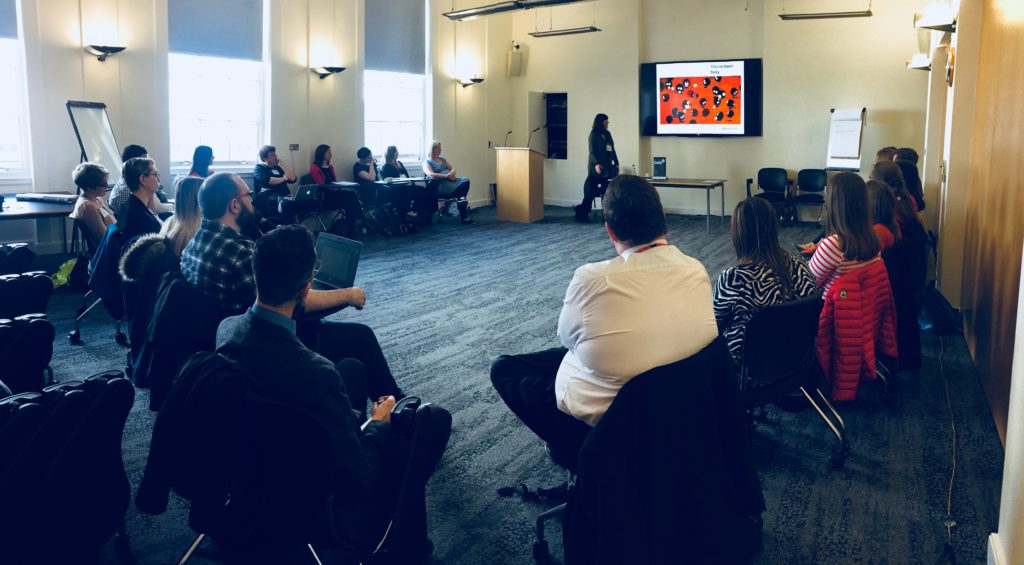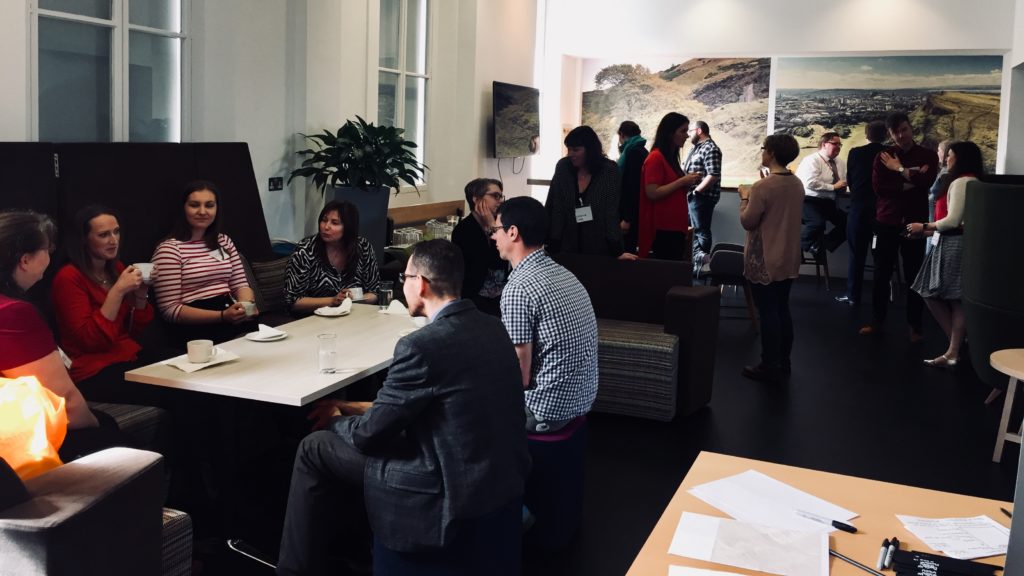 Last week, several members of the Delib gang headed out from our Bristol, England HQ and descended on Edinburgh, Scotland for the first Citizen Space & Dialogue user group of 2018. A great opportunity to meet some of our Scottish customers, hear how people are using our products and try haggis, naturally I jumped at the chance to go along.
Last week, several members of the Delib gang headed out from our Bristol, England HQ and descended on Edinburgh, Scotland for the first Citizen Space & Dialogue user group of 2018. A great opportunity to meet some of our Scottish customers, hear how people are using our products and try haggis, naturally I jumped at the chance to go along.
For this user group, we were kindly hosted by the City of Edinburgh Council at their City Chambers headquarters. (Fans of the Avengers franchise may be as excited as I was to discover that the building makes a brief appearance in the latest film, Avengers: Infinity War. Not that I’m comparing the Delib team to the Avengers – but I bet you’ve never seen all of them/us in one room at the same time…)
Once we were over the grandeur of the building and had fuelled up on coffee, we got down to business. Here come some learnings I took away from the day:
1. GDPR compliance is the talk of the town
We heard from The City of Edinburgh Council about their extensive efforts to get ahead of the curve on GDPR compliance. Whilst they still have some things to tackle, it was clear from Emma Candy, the council’s Senior Policy and Insight Officer, that they have done some great prep.
She told us about how they’ve been collaborating closely with their Information Governance Unit to work out exactly how to archive and/or delete data from consultations in line with the new laws. And I can’t really not mention her appreciation for Citizen Space being GDPR-compliant, giving us some props for the work we’ve done to make sure that’s the case. (Thanks, Emma!)
2. Good practice needs cultural embedding
Sophie Marshall from Police Scotland’s Consultation and Engagement team told us about the ways they’re working to embed best practice within their organisation. For example, she talked about their commitment to ‘closing the response loop’ – making sure participants know what’s happened with their input at the end of an exercise.
She detailed the process they used in their 2026 strategy engagement exercise, which was spread over 10 weeks and split into a range of themes. She talked about how the flexibility of Citizen Space as a platform allowed them to both monitor outreach and manage internal needs in the same place. And she explained how the team are building a communications and engagement toolkit to educate staff on good consultation practice – so that it’s embedded in their culture and not a case of reinventing the wheel with each project.
This good practice includes encouraging proactive outreach and promotion of consultations – a habit which has already generated increased levels of responses.
3. The GDPR devil is in the details
Chris Connolly from the Scottish Government was determined not to let being ill stop her from helping people with GDPR! Unfortunately, she wasn’t able to join us on the day – but, in her absence, she still managed to send along a summary of her talk on everyone’s 4 favourite letters.
We kicked off a discussion around Chris’s suggestion that much of the purpose of GDPR isn’t new – a lot of it is simply about communicating how we store data. It became clear that people still aren’t quite sure on certain aspects of GDPR – which consent to seek when, for example, and whether or not it’s valuable to collect IP addresses – but it is generally understood that organisations must make sure they are collecting relevant information and handling it properly. Again, a consistent theme emerged from these conversations about the importance of forming organisational habits to handle data correctly once it is collected.
We were also pleased to hear from Chris’ colleague Lauren Tuckerman who kindly offered to tell us a bit about her work interning with the Scottish Government’s consultation team, which will form part of her PhD.
4. Centralising response data can have big benefits: from ease of use to response rates
We heard from Amber Souter at Food Standards Scotland about transitioning to running their consultations on a centralised digital platform. Compared with their previous methods of seeking consultation submissions via email or post, she said that switching to Citizen Space has led to increased response rates and a more professional feel to their engagement efforts.
When they needed to gather stakeholder views about a draft Regulatory Strategy, they had a wide audience to consult and Citizen Space’s ease of use and response publishing feature made it simple to engage people and feed back to them after.
5. Dialogue garners good ideas
Dialogue continues to be used in differing ways for some pretty cool ideas generating exercises. Delib colleague Natalie reported back on how the Isle of Man Government opened up an online conversation about their SAVE programme and HMCTS gave staff a voice on internal decisions. (My ears may have pricked up at this point as I’ve recently spoken with both organisations about their experiences using Dialogue!)
6. Experimenting & refining the approach to engagement is valuable
Kirsty Christie, Web and Digital Media Officer for Scottish Borders Council, told us how they’re using a trial and error approach to their use of Dialogue. Before, it was difficult to reach a broad spectrum of people due to a wide geographic spread in the area, but Dialogue allowed them to seek opinions online in a convenient and quick way. The communications team recognise the importance of getting the public involved in decision-making and found Dialogue to be an effective way to run quick experiments and test hypotheses. They found that contrary to their expectations, splitting their budget consultation out into discussions on specific topics and areas of interest did not boost response rates, so they’ve gone back to a more holistic approach of consulting on the budget as a whole piece.
7. Promote!
OK, this isn’t a new lesson but it’s a drum that always merits a bit more banging! In consultation, promotion is vital in engaging people. They can’t participate if they’ve never heard about the opportunity to get involved!
The folks at the Scottish Parliament – Ailsa Burn-Murdoch, Hayley Forrester and Steven Blyth – emphasised the importance of making consultation activity accessible and available to the public. The issues they’re dealing with can be complex and it’s vital to convey them to people in ways that they will be able to understand.
The Scottish Parliament chose to use Dialogue for their online engagement because it had been recommended by their peers (including the Welsh Assembly), and because it could gather views and opinions that wouldn’t be captured through other consultation activities. Similarly to Scottish Borders Council, they were also keen on the potential for a digital approach to more easily engage geographically disparate groups of people. They’ve been using Dialogue alongside offline outreach events, where they’ve found it’s added value and opened up more ways for people to get involved. They were also pleased to report that they’ve seen genuine discussion in the comments section of ideas!
So there we have it! User group number one of the year is complete and, as always, we learnt a lot from it. There’s just no substitute for hearing these at-the-coalface accounts of people’s experiences, so thanks very much to all the attendees and especially the speakers.
If you’re interested to see what people in your field are doing and are a user of Citizen Space or Dialogue, why not come along to our next one? It’s set to take place in Northern Ireland in September and we’ll release details closer to the time. If that’s too far away, we also have a training session at our Bristol HQ in July; there’s a handful of spaces still available but they’ll go quickly!

